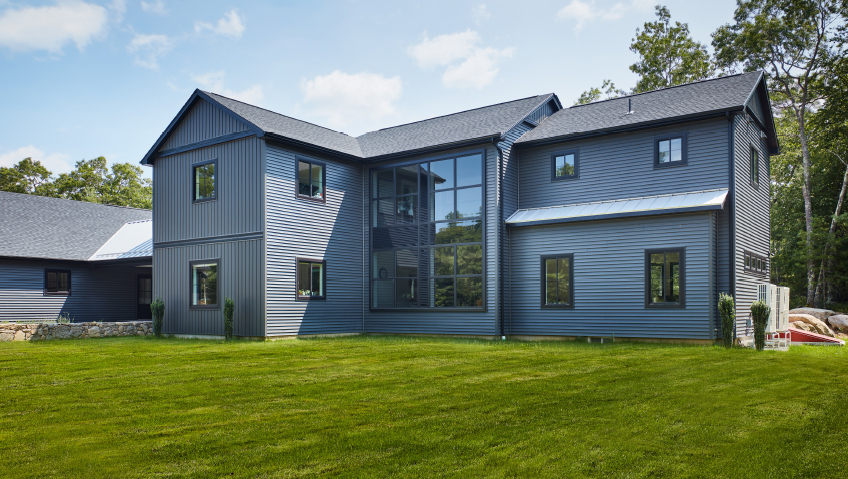Serving 14 states, Apex Homes is a company of good, honest modular home experts delivering the lasting value homeowners dream of. While there are many reasons some prefer their homes to be prefabricated, saving time and money are often the deciding factors.
Home manufacturing, as opposed to construction, is an intriguing field considering the current, constantly shifting economic climate. And with demand rising for everything from tiny homes to earthships, it appears to be a good time for those in home prefabrication to push the envelope in this growing market.
Authentically custom
Working from its 154,000-square-foot facility spread across 37 acres in Middleburg, Pennsylvania, Apex Homes transforms the traditional lack of choice in this type of home building—which has turned many prospective homeowners against the idea—into an authentically custom process that has customers lining up for their share of the action.
In addition to saving time and money, modular homes offer myriad other benefits—namely quality. Firstly, there is no water damage to navigate during the building process as homes take shape inside the safety and cover of a factory. There are also third-party quality control inspections where no stone is left unturned, ensuring that even minor details are taken care of. As modular buildings can be shipped to far-off states, the integrity of the structures is paramount to their safe delivery and installation. There are also the obvious benefits of the time it takes to complete a modular home—breathtakingly short compared to conventional construction, with lead times as little as two months from when the unit settles onto its foundations until completion.
As an example, Lynn Kuhns, President, cites a project comprising a 75-unit apartment block that took less than 20 months to complete, comparing it to the typical 30-month lead times for buildings like this one using conventional building methods.
For Apex Homes, flexible, custom fabrication means more than simply producing quality modular homes on shorter timelines; it also means building relationships that last. And those, as we know, cannot be fabricated. It is in this generosity of spirit that the company’s popularity resides.
Far from sticking to set floor plans and finishes, this team does everything it can to provide customers with their custom prefabricated home dream. Apex has also built inner city apartment buildings in places like Philadelphia and Connecticut in this way; police stations; daycare centers; stadium bathrooms; and diverse other types of buildings.
“Let’s say you provide us with a floor plan that fits your needs and likes. We can convert it into a modular format and give you what you’re looking for,” says Kuhns, clarifying that the modular medium does have restrictions in some areas, which is simply the nature of the method.
Beyond that, however, Apex Homes is a true trailblazer when it comes to expanding the boundaries of this building method. For those who arrive without their own ideas and require guidance, a generous portfolio of nearly 150 floor plans awaits. While most people prefer doing their signature thing with custom designs, some appreciate the ease and convenience of existing drawings.
Above and beyond
As a business that genuinely cares about its customers, Apex Homes’ relationships with them are paramount to its success. Often going above and beyond to get to know people, hospitality is a large part of what the company offers. The company’s people apply themselves to understanding what makes customers tick and providing them with the best product possible.
“We try to establish those friendships, because when things are tough, the relationships can continue to stay strong. And we work through the challenges as they arise,” Kuhns says, underlining the importance of resolving errors and problems maturely and in functional ways, ultimately paving the way for excellence.
Its sterling work has earned the company numerous awards—most recently, the MHBA 2023 Manufacturer of the year two years in a row, as well as Home of the Year under 2,500 square feet for 2022. As well as delivering quality, the company also challenges itself to prevent waste, repurposing materials as far as possible and where appropriate. That, perhaps, makes modular homes one of the best choices for those equally pragmatic about such matters.
“We were green before green was green, from the standpoint of building in a controlled environment. We recycle the majority of our materials,” Kuhns says. “In a month, we have two 40-yard containers that go to landfill; that’s it. Considering that we build four to eight houses a week, that’s very good, especially considering the amount of waste in conventional building methods.”
Centuries of experience
In addition to being conscientious and responsible with both materials and energy efficiency, there’s no shortage of experience at Apex Homes either. With over 200 years of combined experience—nearly 100 of those in its management team alone—project owners feel safe knowing they have the best hands on deck when working with this industry legend. Employing modular and panelized components exclusively or in combination to create the ideal floor plan, the company’s engineers are well-versed in this method for optimum gains for those who will eventually live in these homes.
These building elements also give designers a lot of scope to be creative. Together with its other capabilities, the Apex Homes facility also features a cabinet fabrication outfit supplying all its custom needs. That effectively means that, at Apex, nobody is in danger of moving into what folk singer Malvina Reynolds called “little boxes” in her famous 1962 song by that name. On the contrary, we’re in the specialized market of customization. There’s a lot we can do so that it doesn’t look like your typical modular home,” says Kuhns. Indeed, a marked move toward quality finishes, including walk-in showers, quartz countertops, and ceramic flooring, is taking this type of housing into the realm of fresh, modern living.
From its beginnings as a modular home fabricator in 1990, Apex Homes has always been known to be innovative. Buying the business on a bankruptcy sale in 2014 with 75 staff on board, Kuhns and his team have rebuilt the company to an annual sales mark of $26 million and a staff of 129. The family-owned business then morphed into an entirely new market as it took its mission—developing solutions that work—seriously. But it also knows how to show its people a good time.
Building a family
“We look at our employees as family because we have a lot of employees who have been here from day one,” says Kuhns. “We respect our employees in what they do,” he adds, underlining the importance of spending downtime together—like at the monthly luncheons, a tradition the company does its best to maintain.
End-of-the-year festivities follow a similar path, with a generous Christmas lunch preceded by an annual awards ceremony where people receive recognition for their contributions throughout the year. Kuhns makes no bones about why he is a tremendous fan of the Apex team.
“Many of us have worked together for a long time… We all have a common goal we try to accomplish,” he says. “I’m fortunate and blessed to have a great staff and team.”
Beyond the women’s shelter, another of the charities Apex Homes supports is one close to home—Kelsey’s Dream, a foundation supporting young cancer patients. Diagnosed around the age of five, the Kuhns’ daughter, Kelsey, passed away just after her twelfth birthday after a seven-year battle with the disease.
Following this tragic loss, Kelsey’s little sister brought Hopper the cancer crusher, a frog, to life—a little stuffed therapy animal that the Kuhns family now dispatches to healthcare facilities to share with sick children undergoing treatment. As one can imagine, the ordeal has left scars, which the family chooses to handle with a deep humility that today helps them to serve others facing the same pain.
In addition, the team supports a local women’s shelter by supplying them with building materials when needed. As a further boost to the shelter, Apex Homes regularly buys its staff meals there, served by the company’s owners.
The future is modular
To ensure this level of engagement persists well into the future, the company contributes a lot of its time and energy to building up the next generation, hosting industry seminars and other events at two local technical schools.
The benefits of modular home fabrication are indeed significant for those who choose this career path, and are important to impress upon students and other potential candidates. In the modular field, staff members work in an enclosed facility, keeping them out of the elements in a safe, clean, and comfortable working environment. Of course, the demands of safety and travel are also much more agreeable. And at Apex Homes, opportunities for personal and professional growth abound, as the team continuously expand their knowledge, skills, and experience.
The company’s owners ensure that employees have everything they need to do their best work at their fingertips. That means timely upgrades, the latest software, and staying on top of the latest developments in the industry. Apart from heating its facility efficiently thanks to new technology, the company recently installed a new computer numerical control (CNC) machine in its cabinet shop to improve accuracy and output. It also introduced a new, remote-controlled overhead crane system that allows for vastly improved, easy installation of complete roofs.
With this ever-present awareness of keeping in stride with the future, Apex Homes is committed to continually expanding its abilities alongside a growing focus on the energy efficiency of its modular buildings. Additionally, it is planning further enhancements to its home base. The goal is to ease and simplify its processes to further benefit staff and, as always, to provide customers with enduring value.






